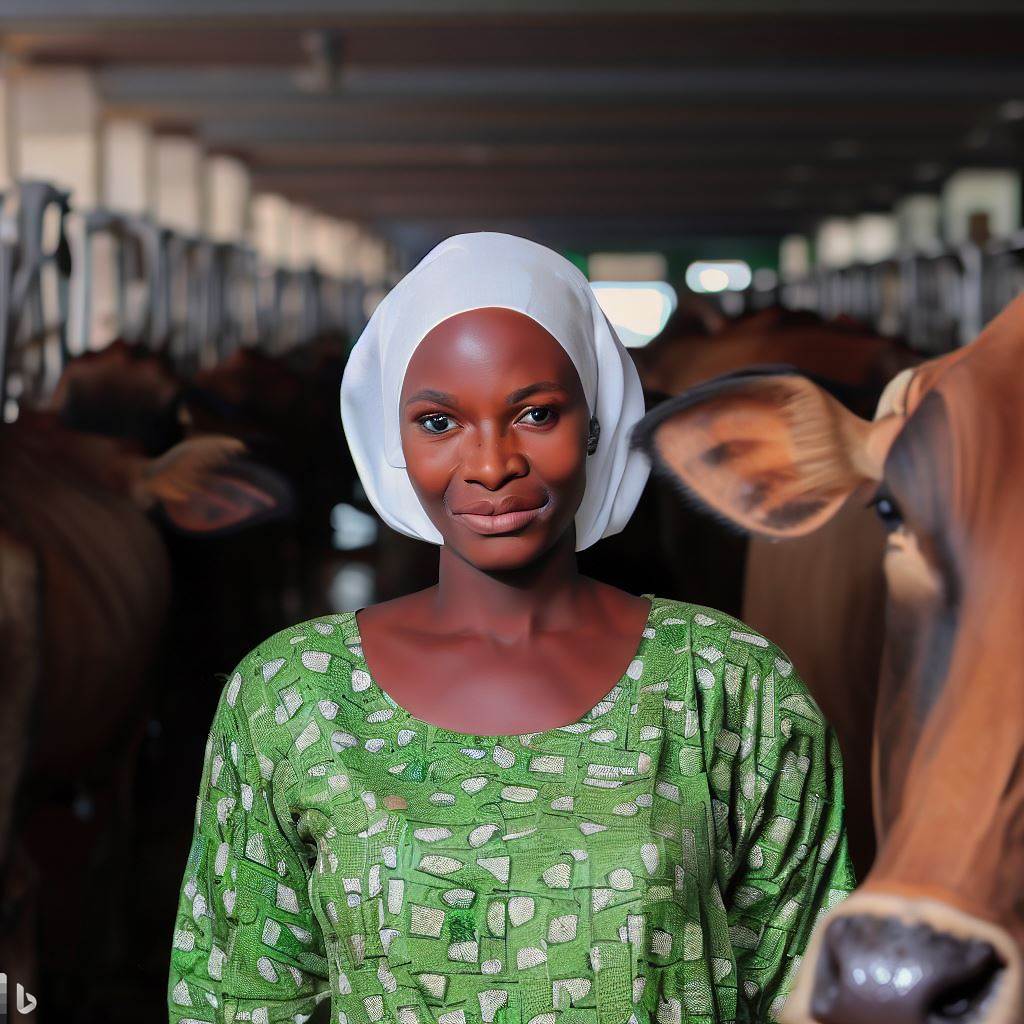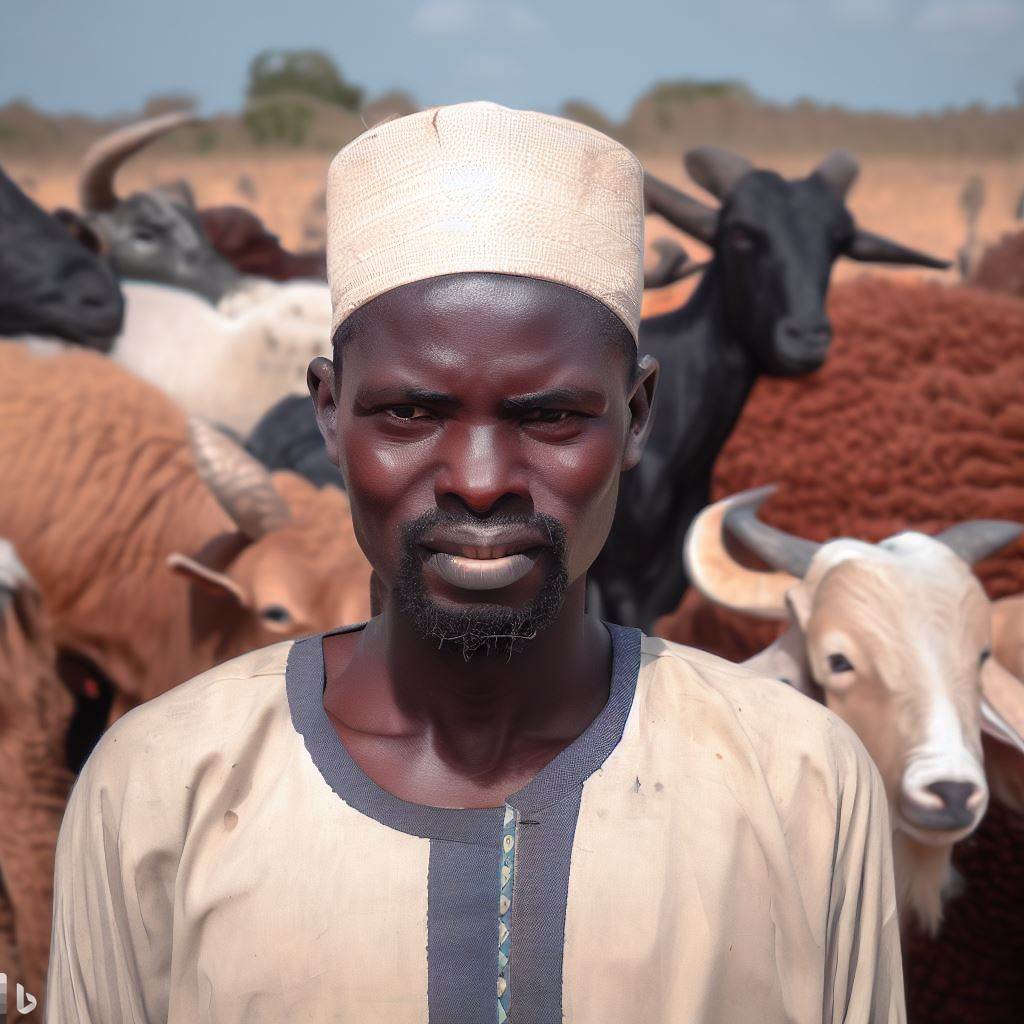Introduction
Nigerian livestock production is crucial for the country’s economy and food security. Breeds play a vital role in improving livestock productivity, adaptability, and profitability.
This blog post aims to highlight the significant role of breeds in Nigerian livestock production and their impact on the nation’s agricultural sector.
Nigerian Livestock Production:
Nigeria’s agricultural landscape thrives on livestock farming, a vital component of its economy. The sector contributes significantly to employment, nutrition, and economic stability.
The Importance of Breeds:
- Genetic Diversity: Different livestock breeds offer unique traits and adaptations, ensuring resilience against diseases and changing environments.
- Enhanced Productivity: Selective breeding optimizes traits like growth rate, milk yield, and meat quality, increasing overall productivity.
- Climate Resilience: Locally adapted breeds thrive in Nigeria’s diverse climatic conditions, reducing vulnerability to extreme weather.
- Cultural Significance: Indigenous breeds uphold cultural heritage, playing a role in traditional practices and ceremonies.
- Disease Resistance: Some breeds possess natural resistance to common diseases, reducing the need for excessive medical intervention.
Thesis Statement: Strategic breed selection and management lie at the core of Nigerian livestock production, fostering genetic diversity, productivity, and resilience.
Overview of Nigerian Livestock Production
Significance
Livestock production plays a crucial role in Nigeria’s economy, contributing to food security, employment, and income generation.
Major Livestock Species
Cattle, sheep, goats, pigs, and poultry are the major livestock species in Nigeria. They provide meat, milk, eggs, and other by-products.
Challenges in the Nigerian Livestock Industry
- Inadequate infrastructure: Lack of proper roads, storage facilities, and processing plants hinders livestock production and marketing.
- Limited access to quality breeds: Nigerian farmers often struggle to obtain high-yielding and disease-resistant breeds, which impacts productivity.
- Poor healthcare services: Inadequate veterinary care and disease control measures contribute to livestock mortality and reduced production.
- Inefficient marketing systems: Limited market access and poor value chain linkages result in low prices and income for livestock farmers.
- Inadequate funding and investment: Insufficient financial support and investment in research and development hamper the growth of the livestock industry.
- Climate change and environmental degradation: Changing climatic patterns and deforestation pose challenges to grazing lands and feed availability.
- Inadequate policy framework: The absence of clear policies and regulations affects the development and management of the livestock industry.
- Insecurity and conflicts: Rural areas affected by insecurity and conflicts disrupt livestock production activities and access to markets.
Despite these challenges, the Nigerian livestock industry holds tremendous potential for growth and development.
Improving the breed quality of the livestock species can significantly enhance productivity and profitability.
How to address the challenges
To address the challenges, the following interventions are necessary:
- Infrastructure development: Building better roads, storage facilities, and processing plants will improve market access and reduce post-harvest losses.
- Breeding programs: Implementing breeding programs to enhance the availability and accessibility of improved and high-yielding breeds.
- Strengthening healthcare services: Investing in quality veterinary care, disease control measures, and vaccination programs to improve animal health and productivity.
- Market linkages and value chain development: Establishing efficient and transparent marketing systems while promoting value addition and market diversification.
- Increasing funding and investment: Governments, private sector, and development partners should prioritize funding and investment in livestock production.
- Climate-smart practices: Encouraging adoption of climate-smart practices such as proper grazing management, reforestation, and feed conservation techniques.
- Policy reforms: Developing and implementing clear and effective policies that support sustainable livestock production, research, and development.
- Ensuring security and peace: Creating a peaceful and secure environment to enable livestock farmers to carry out their activities without fear of conflicts.
In essence, the importance of breeds in Nigerian livestock production cannot be overstated.
Livestock plays a vital role in contributing to Nigeria’s economy, providing food security, employment, and income generation.
However, the industry faces several challenges that need to be addressed through targeted interventions and policy reforms.
By focusing on improving breed quality, infrastructure, healthcare services, and market linkages, Nigeria can unlock the full potential of its livestock industry and enhance overall agricultural productivity.
Read: Leveraging Cooperatives for Dairy Production in Nigeria
Understanding Breeds in Livestock Production
What breeds and their role in livestock production
- Breeds refer to specific groups of animals within a species that share distinct characteristics.
- They play a crucial role in livestock production as they determine the overall productivity and profitability of the industry.
- Different breeds have different genetic traits, which impact factors such as growth rate, disease resistance, and adaptability.
- By selecting specific breeds, farmers can optimize the production of meat, milk, wool, or other desired products.
- Breeds also contribute to the sustainability of livestock production by adapting to various environmental conditions and changing market demands.
The concept of breed improvement and its importance in enhancing productivity and profitability
- Breed improvement refers to the deliberate selection and breeding of animals with superior genetic traits.
- The primary objective is to enhance the desired traits while minimizing the undesirable ones.
- This process involves identifying the best individuals of a breed and using them as parents for future generations.
- Breed improvement is critical in livestock production as it leads to better quality products, increased productivity, and profitability.
- By continually improving breeds, farmers can enhance the efficiency of production systems, resulting in higher yields and reduced costs.
- Improved breeds are more resistant to diseases and have better adaptability to changing environmental conditions, ensuring more sustainable production.
The different factors that influence breed selection in Nigerian livestock production
- Climate: The local climate determines the breed’s ability to cope with temperature, humidity, and other environmental factors.
- Purpose: The intended use of the animals, such as meat, milk, or work, influences breed selection.
- Market demands: Farmers consider consumer preferences and market trends to ensure the breed meets the demand for specific products.
- Health and disease resistance: Some breeds possess inherent resistance to common diseases, reducing the need for excessive medical interventions.
- Adaptability: Breeds that can thrive in diverse geographical regions and feed conditions are preferred for better productivity.
- Reproduction and fertility: High reproductive rates and fertility are essential for efficient breeding and increased profitability.
- Genetics and breeding history: The pedigree and genetic background of the breed are crucial considerations for selecting superior animals.
- Livestock management systems: The available resources, infrastructure, and management practices of the farm also influence breed selection.
In review, breeds play a significant role in Nigerian livestock production. They determine the productivity, profitability, and sustainability of the industry.
Breed improvement is crucial in enhancing desired traits and minimizing undesirable ones. Factors like climate, purpose, market demands, health, and adaptability influence breed selection.
By making informed decisions on breed selection and continuously improving breeds, Nigerian farmers can optimize production, meet market demands, and ensure the long-term success of their livestock enterprises.
Read: Nigeria’s Pioneering Dairy Producers: Success Stories
Importance of Breeds in Nigerian Livestock Production
Enhancing Productivity
Breeds play a crucial role in the overall productivity of the Nigerian livestock industry. Livestock farmers strive to achieve high productivity levels by selecting and breeding animals with desirable traits.
These traits, such as rapid growth, improved milk production, and higher meat yield, can significantly impact the output and profitability of the industry.
For instance, the introduction of improved Zebu and N’dama cattle breeds in Nigeria has resulted in higher productivity levels.
These breeds exhibit better growth rates, disease resistance, and improved meat quality.
Farmers who rear these high-yielding breeds experience increased profits and contribute to the overall development of the livestock sector.
Disease Resistance and Adaptability
Livestock diseases pose significant challenges to the Nigerian livestock industry. However, certain breeds have exhibited resistance and resilience to prevalent diseases, mitigating the economic impact.
Breeders focus on selecting and breeding animals with genetic resistance to diseases like trypanosomiasis and foot-and-mouth disease.
Additionally, adaptability to different climatic conditions is crucial in a country as diverse as Nigeria.
Breeds such as Sahelian goats and West African Dwarf sheep have demonstrated remarkable adaptability to various ecological zones.
They can thrive in hot and arid environments, as well as humid and rainy regions. The adaptability of these breeds allows livestock farmers to rear animals in different parts of the country, expanding the industry’s reach and profitability.
Market Value and Demand
The market value of livestock breeds is determined by their quality, productivity, and market demand.
Breeds that exhibit superior traits command higher prices in the market, leading to increased profitability for livestock farmers.
Consumers are willing to pay more for animals or animal products that offer better productivity, such as higher milk yield, better meat quality, or increased disease resistance.
The demand for specific breeds in Nigeria has been on the rise. This increasing demand is driven by factors such as population growth, changing dietary preferences, and the desire for higher-quality livestock products.
As a result, the prices of certain breeds have significantly increased in recent years. This trend has positively impacted livestock farmers, allowing them to maximize their profits and invest in further improving their breeds.
In a nutshell, breeds play a crucial role in Nigerian livestock production. They enhance productivity by contributing to higher output levels and improving farm profitability.
Breeders focus on developing disease-resistant breeds and selecting animals with adaptability to different climatic conditions.
Additionally, market demand for specific breeds has led to increased prices and greater profitability for livestock farmers.
The importance of breeds in Nigerian livestock production cannot be overstated as they continue to shape and drive the growth of the industry.
Read: Profitability Analysis of Dairy Production in Nigeria

Government Initiatives and Support
Government policies and initiatives aimed at breed improvement and promoting Nigerian livestock production
The Nigerian government has implemented various policies and initiatives to improve livestock breeds in the country.
One of the key initiatives is the establishment of the National Livestock Transformation Plan (NLTP).
The NLTP focuses on breed improvement through the introduction of high-quality genetic material and modern breeding techniques.
Under the NLTP, the government collaborates with international organizations and breed associations to import superior livestock breeds.
This initiative aims to upgrade the local stock by crossing them with superior breeds, resulting in improved productivity.
Furthermore, the government has introduced the Breed Improvement Program (BIP) to promote the use of improved breeds.
The BIP provides incentives and support to livestock farmers who adopt improved breeds and practice proper breeding management.
Through the BIP, farmers have access to improved breeds at subsidized rates and receive technical guidance on proper breeding practices.
Additionally, the government has implemented policies that restrict the importation of low-quality breeds to protect local livestock producers.
These policies ensure that Nigerian livestock farmers have access to high-quality breeds that can thrive in local climatic conditions.
The government also provides training programs and workshops to educate farmers on breed selection, breeding techniques, and animal health management.
Financial or technical support offered to livestock farmers for breed improvement
Financial support is crucial for livestock farmers to afford improved breeds, which are often more expensive.
The Nigerian government, through various agricultural intervention programs, offers financial support to livestock farmers.
These programs provide loans, grants, and subsidies to enable farmers to acquire improved breeds and invest in breed improvement activities.
Farmers can access these funds for purchasing improved breeding stock, modern equipment, and infrastructure.
Furthermore, the government collaborates with financial institutions to develop specialized loan packages tailored for livestock farmers.
Technical support is equally important to ensure successful breed improvement.
The government partners with veterinary professionals, research institutions, and extension services to provide technical assistance to farmers.
Extension officers visit farms to offer guidance on breed selection, breeding techniques, nutrition, and disease management.
The government also invests in research and development to improve local breeds and develop new breeding technologies.
These efforts contribute to the availability of relevant research findings and technologies for farmers to enhance breed improvement.
Impact of these initiatives on the overall industry and productivity levels
The government’s initiatives and support for breed improvement have had a significant impact on the Nigerian livestock industry.
Improved breeds have led to increased productivity and profitability for livestock farmers.
The introduction of superior genetic material has resulted in animals with better growth rates, disease resistance, and higher milk or meat yield.
The use of improved breeds has also enhanced the overall quality of Nigerian livestock, making them more competitive in both domestic and international markets.
As a result, the livestock sector has experienced growth, attracting more investments and creating employment opportunities.
The initiatives have also promoted sustainable development in rural areas, where livestock farming is a vital source of income.
Moreover, increased productivity levels have contributed to food security by meeting the growing demand for animal protein in Nigeria.
The government’s support programs have empowered livestock farmers and improved their livelihoods.
Farmers who have adopted improved breeds and benefited from financial and technical support have achieved higher incomes and improved standards of living.
In general, the government’s initiatives and support play a crucial role in breed improvement and promoting Nigerian livestock production.
By implementing favorable policies, providing financial resources, and offering technical assistance, the government empowers farmers to enhance productivity, profitability, and sustainability in the livestock industry.
Read: The Future of Dairy and Livestock Production in Nigeria
Challenges and Future Directions
Challenges faced in improving breeds and enhancing livestock production in Nigeria
- Limited access to quality breeding stock and genetics.
- Inadequate infrastructure for breed improvement programs.
- Poor animal health and disease control measures.
- Lack of awareness and understanding of the importance of breeds in livestock production.
- Inefficient breeding and selection practices.
Possible solutions and strategies to overcome these challenges
- Establishment of breed improvement centers to ensure availability of quality breeding stock.
- Investment in infrastructure development, such as research facilities and laboratories.
- Implementation of effective animal health programs to control diseases and improve productivity.
- Education and awareness campaigns to inform farmers about the benefits of improved breeds.
- Promotion of proper breeding and selection practices through training and capacity building.
Recommendations for future breed improvement programs and policies
- Encourage public-private partnerships to enhance collaboration and resource sharing.
- Allocate sufficient funding for research and development in breed improvement.
- Establish a national database for tracking breed performance and genetic information.
- Support the development of breed-specific breeding objectives and selection criteria.
- Regular monitoring and evaluation of breed improvement programs to ensure effectiveness.
All in all, improving breeds and enhancing livestock production in Nigeria face several challenges, including limited access to quality breeding stock, inadequate infrastructure, poor animal health measures, lack of awareness, and inefficient breeding practices.
However, with the implementation of solutions such as establishing breed improvement centers, investing in infrastructure, implementing effective animal health programs, raising awareness, and promoting proper breeding practices, these challenges can be overcome.
To further improve breed improvement programs and policies, it is recommended to encourage partnerships, allocate sufficient funding, establish a national database, develop breed-specific objectives, and regularly monitor and evaluate the programs.
By addressing these challenges and implementing the suggested strategies, Nigeria can achieve significant improvements in its livestock production and overall agricultural sector.
Conclusion
Breeds play a crucial role in Nigerian livestock production, contributing to its success. Throughout this blog post, we have highlighted the various benefits and importance of breeds.
It is essential for readers to recognize the significance of breeds in supporting sustainable livestock production in Nigeria.
By understanding breeds, farmers can make informed decisions to improve productivity and ensure the long-term success of the industry.
Breeds Matter:
- Genetic Diversity: Breeds ensure resilience and adaptability to diverse environmental conditions.
- Productivity Boost: Selective breeding enhances meat, milk, and wool production for economic growth.
- Disease Defense: Resistant breeds lower disease susceptibility, reducing reliance on medications.
- Cultural Value: Indigenous breeds preserve traditions and cultural practices in livestock farming.
Recognizing the Significance:
- Sustainable Future: Breeds support sustainable livestock farming for food security and economic stability.
- Local Adaptation: Indigenous breeds thrive in Nigerian climates, reducing environmental risks.
- Healthier Livestock: Proper breed management leads to healthier animals and improved livelihoods.
Take Action: Embrace breed diversity to bolster Nigeria’s livestock sector. Your choices today ensure a prosperous and resilient tomorrow.




